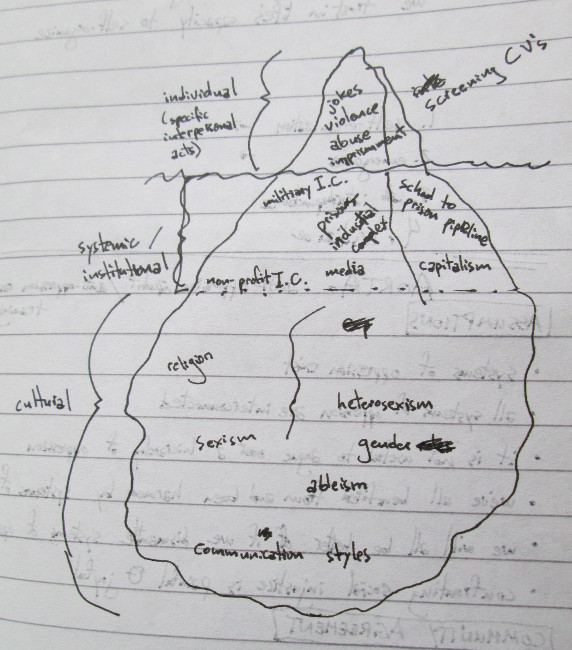Anti-Oppression Audit workshop notes
In no particular order, here’s a brain dump of ideas gleaned from the workshop “Not the IRS! Anti-Oppression Audits”, presented by the Anti-Oppression Resource & Training Collective (AORTA) at the Eastern Conference for Workplace Democracy, July 26-28 2013, in Philadephia, PA.
AORTA’s job is to give trainings on these issues. In the 1.5h workshop at the conference, they talked about the importance of doing anti-oppression audits for democratically run organizations (collectives, workers’ cooperatives, etc), then demonstrated a few exercises they use when leading these workshops. I’ve attended several workshops of this type over the years, and found AORTA’s to be particularly well facilitated. Here are a few quick notes; their handout is attached below.
Assumptions
Basic assumptions taken as a starting point of discussion. These are not up for debate.
- systems of oppression exist
- all systems of oppression are interconnected
- it is not useful to argue over a hierarchy of oppression
- we've all benefited from and been harmed by systems of oppression
- we will all be better off if we dismantle systems of oppression
- confronting social injustice is painful & joyful
Community Agreement
These are agreed upon standards of behaviour used to guide the discussion.
- one diva, one mic (do not interrupt while others are talking)
- no-one knows everything, together we know a lot
- move up, move up (if you are taking up a lot of space while speaking, make an effort to say less; if you are saying little, you should say more)
- accept & expect a lack of closure
Iceberg of Oppression
The basic idea here is that the most obvious forms of oppression (a sexist joke, refusing to hire someone due to their race, etc) are just the tip of a larger structure hidden from view, like an iceberg. Above the water in plain view, on the individual level, we see specific acts between people. Below that are the systemic and institutional structures which make those actions possible (everything from the prison industrial complex to capitalism itself), and underlying that is a society’s culture itself (from its religions and communication styles, to heterosexism, ableism, and other forms of discrimination). See my poor sketch of a diagram created together by the workshop participants:

Why this matters
On a related note, I bring you a quote I heard in another workshop (“Emerging Possibilities for New Economies in the South”, by a group of people who recently worked to help elect Chokwe Lumumba, a progressive mayor, in Jackson, Mississippi):
Always bear in mind that the people are not fighting for ideas, for the things in anyone's head. They are fighting to win material benefits, to live better and in peace, to see their lives go forward, to guarantee the future of their children. Amilcar Cabral
